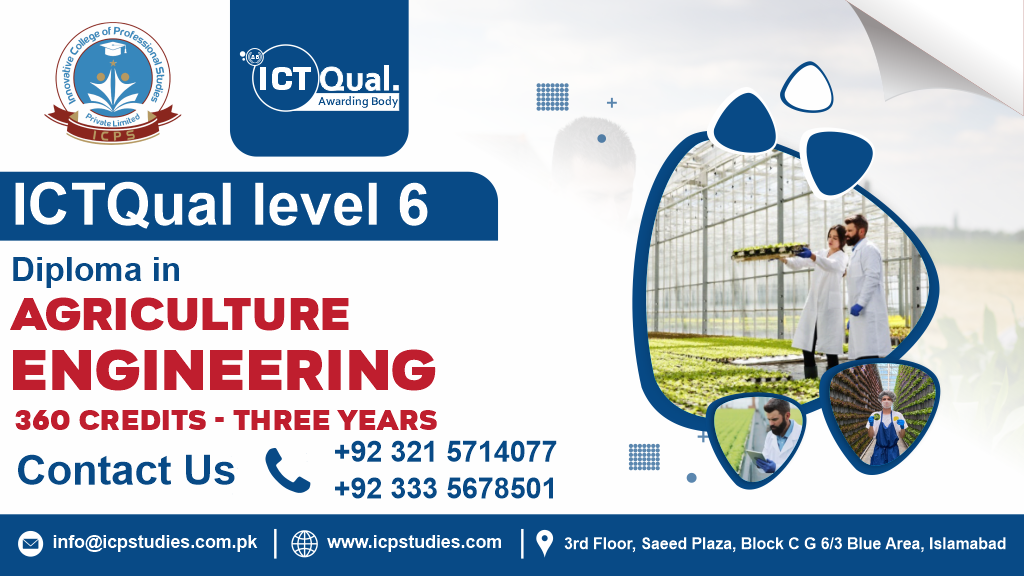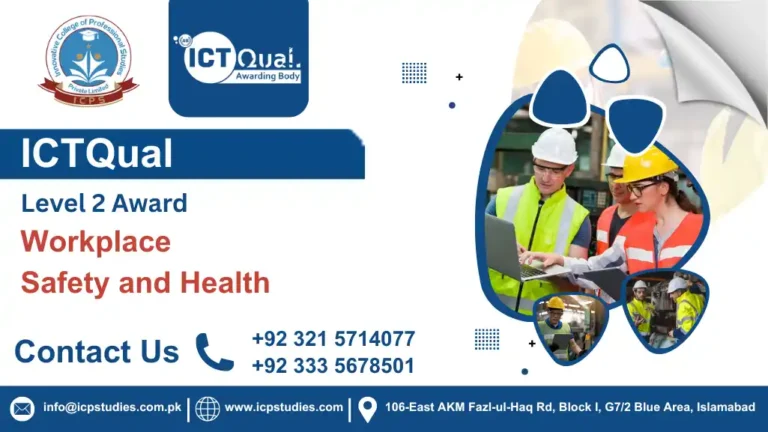The ICTQual Level 6 Diploma in Agricultural Engineering is a specialized qualification designed for individuals seeking advanced skills and knowledge in the field of agricultural engineering. This comprehensive three-year program, accredited for 360 credits, provides a solid foundation for those aiming to make significant contributions to modern agriculture through the application of engineering principles and innovative technology.
Agricultural Engineering is a multidisciplinary field that blends engineering, technology, and agriculture to develop efficient systems for producing food, fiber, and other products. The ICTQual Level 6 Diploma in Agricultural Engineering offers a cutting-edge curriculum that equips students with the practical and theoretical knowledge needed to thrive in this growing sector. The qualification is designed to meet the industry demands for skilled professionals capable of tackling challenges related to agricultural machinery, infrastructure, automation, and sustainability.
The ICTQual Level 6 Diploma in Agricultural Engineering is a robust and comprehensive program that provides students with the tools, knowledge, and experience needed to succeed in a rapidly evolving agricultural sector. Whether you are new to the field or seeking to advance your career, this diploma offers the opportunity to become an expert in agricultural engineering, playing a key role in the future of sustainable agriculture and food production.
For those passionate about making a real difference in the world of agriculture, this course represents the perfect pathway to achieving your career aspirations.
All About ICTQual Level 6 Diploma in Agriculture Engineering 360 Credits – Three Years
Course Overview
challenges of modern agriculture, which is increasingly influenced by technological advancements and the need for sustainability.
Throughout the course, students will explore key areas such as agricultural machinery, precision farming, water management, renewable energy solutions, and post-harvest technologies. The curriculum combines theoretical learning with practical applications, ensuring that graduates are well-prepared to apply engineering principles to optimize agricultural systems, enhance productivity, and reduce environmental impact.
This diploma is ideal for individuals who wish to make a tangible impact in the agricultural sector by driving innovation and improving the efficiency of farming practices. Whether you’re looking to pursue a career in agricultural engineering, advance in your current role, or explore entrepreneurial opportunities, the ICTQual Level 6 Diploma provides a robust foundation to succeed in this dynamic and essential industry.
Study Units
- Year 1: Foundational Knowledge
- Introduction to Agricultural Engineering
- Basics of Soil Science
- Plant Science and Crop Physiology
- Introduction to Farm Machinery
- Principles of Irrigation and Drainage
- Environmental Science in Agriculture
- Mathematics for Engineers
- Fundamentals of Agricultural Economics
- Introduction to Renewable Energy in Agriculture
- Agricultural Chemistry
- Engineering Drawing and CAD
- Workshop Practices in Agricultural Engineering
- Year 2: Intermediate Concepts and Applications
- Advanced Soil and Water Management
- Farm Power and Mechanization
- Agricultural Structures and Materials
- Irrigation Systems Design
- Introduction to Precision Agriculture
- Agricultural Waste Management
- Crop Protection Technologies
- Advanced Farm Machinery Operations
- Principles of Agro-Processing
- Renewable Energy Technologies in Agriculture
- Land Surveying and Mapping
- Practical Training in Agricultural Engineering
- Year 3: Advanced Studies and Specialization
- Sustainable Agriculture Practices
- Advanced Irrigation and Drainage Engineering
- Farm Business Management
- Design of Agricultural Machinery
- Precision Farming Systems
- Advanced Soil Mechanics
- Climate-Smart Agriculture
- Renewable Energy Systems for Farms
- Post-Harvest Technology
- Automation in Agriculture
- Research Methods in Agriculture Engineering
- Final Project in Agricultural Engineering
The ICTQual Level 6 Diploma in Agricultural Engineering is designed for individuals with a strong interest in agricultural technology and engineering. To ensure that students have the necessary foundation for success in this advanced program, the following entry requirements apply:
- Academic Qualifications:
- A Level 3 qualification in a relevant field such as Agricultural Engineering, Mechanical Engineering, Civil Engineering, or another related discipline. This could include qualifications like A-Levels, a BTEC National Diploma, or equivalent qualifications.
- Alternatively, relevant work experience in the agricultural or engineering sectors may be considered for candidates who do not meet the formal academic requirements.
- Mathematics and Science:
- A solid understanding of mathematics and science (particularly physics) is recommended, as these subjects form the basis of many engineering principles covered in the course. Ideally, students should have a minimum of GCSEs in Maths and Science (Grade C or above).
- English Language Proficiency:
- Students must have a reasonable level of proficiency in the English language. This is typically demonstrated by a GCSE in English (Grade C or above) or an equivalent qualification.
- For non-native English speakers, an IELTS score of 6.0 or equivalent may be required to ensure students can engage with the course content effectively.
- Personal Attributes:
- A strong interest in agricultural engineering and a desire to work with advanced technology in the agricultural sector.
- The ability to work independently and as part of a team, as many of the course units involve collaborative projects and fieldwork.
- Work Experience (Optional):
- While not mandatory, prior work experience in the agricultural, engineering, or technology sectors can be beneficial, particularly for candidates without formal academic qualifications in the relevant fields.
Applicants who meet these requirements will be well-positioned to undertake the ICTQual Level 6 Diploma in Agricultural Engineering and pursue a successful career in this dynamic and rapidly evolving field.
The ICTQual Level 6 Diploma in Agricultural Engineering is designed for individuals who are passionate about combining engineering and technology to address the challenges in modern agriculture. This course is ideal for:
- Aspiring Agricultural Engineers:
- Individuals who want to pursue a career in agricultural engineering, focusing on designing, developing, and improving agricultural machinery, systems, and technologies.
- Current Professionals in Agriculture:
- Those already working in the agricultural sector, such as farm managers, machinery operators, or agricultural technicians, who wish to deepen their knowledge and transition into more specialized roles in agricultural engineering.
- Engineers from Other Disciplines:
- Professionals with backgrounds in mechanical, civil, electrical, or other engineering fields looking to transition into the agricultural sector and apply their engineering expertise to modern agricultural systems.
- Technology Enthusiasts and Innovators:
- Individuals interested in working with cutting-edge agricultural technologies like precision farming, automation, and renewable energy solutions, and who are eager to contribute to the advancement of sustainable agricultural practices.
- Entrepreneurs and Start-up Enthusiasts:
- Aspiring entrepreneurs who are looking to develop new agricultural technologies or launch businesses focused on agricultural innovations, sustainability, or automation in farming.
- Environmental Advocates:
- Those who are passionate about sustainability and want to make a real impact by developing engineering solutions that reduce environmental footprints and promote sustainable farming practices.
- Recent Graduates:
- New graduates with a background in agriculture, engineering, or technology who want to further specialize in agricultural engineering and take their careers to the next level.
This course is designed for individuals who want to make a significant contribution to the future of agriculture, using engineering and technological innovations to improve productivity, sustainability, and efficiency in the industry.
Learning Outcomes
Year 1: Foundations of Agricultural Engineering
- Introduction to Agricultural Engineering:
- Understand the fundamental principles of agricultural engineering and its critical role in improving modern agricultural practices.
- Basic Principles of Engineering:
- Develop a strong foundation in core engineering concepts such as forces, motion, and energy, and how they apply to agricultural systems.
- Farm Machinery and Equipment: Fundamentals:
- Identify the basic functions, operations, and maintenance of essential farm machinery and equipment.
- Mathematics for Agricultural Engineering:
- Apply mathematical concepts, including algebra, calculus, and statistics, to solve practical agricultural engineering challenges.
- Engineering Drawing and Design:
- Master the skills required to read, interpret, and create engineering drawings and designs for agricultural applications.
- Materials Science in Agricultural Engineering:
- Understand the properties of materials used in agricultural engineering, including selection criteria for different applications.
- Engineering Mechanics:
- Apply the principles of mechanics to analyze and solve problems related to agricultural systems and machinery.
- Agricultural Systems and Technologies:
- Gain a comprehensive overview of agricultural systems, technologies, and innovations that drive modern farming practices.
- Introduction to Precision Agriculture:
- Explore the fundamentals of precision agriculture, including GPS, sensor technology, and data analytics to optimize farm management.
- Water Management Systems in Agriculture:
- Understand the design, operation, and optimization of water management systems, focusing on irrigation and water conservation techniques.
- Soil Science and Engineering:
- Learn about soil properties, soil health, and engineering solutions to improve soil management and productivity.
- Environmental Sustainability in Agriculture:
- Recognize the role of agricultural engineering in promoting sustainability, reducing environmental impact, and optimizing resource use.
- Engineering Safety and Risk Management:
- Develop the ability to identify, assess, and mitigate risks and safety concerns in agricultural engineering projects.
- Introduction to Renewable Energy in Agriculture:
- Understand the basics of renewable energy technologies and their potential applications in improving energy efficiency on farms.
Year 2: Advanced Agricultural Engineering Concepts
- Advanced Farm Machinery and Equipment:
- Acquire an in-depth understanding of advanced farm machinery and equipment, focusing on their design, operation, and optimization.
- Automation and Robotics in Agriculture:
- Explore the integration of automation, robotics, and AI in agricultural processes to improve efficiency and precision in farming practices.
- Agricultural Power Systems:
- Understand the design, operation, and implementation of power systems such as engines and electrical systems in agricultural applications.
- Irrigation and Drainage Systems:
- Develop advanced skills in designing, implementing, and managing irrigation and drainage systems to enhance water use efficiency in agriculture.
- Agricultural Structures and Building Design:
- Learn to design functional agricultural buildings, including barns, storage facilities, and greenhouses, to support farming operations.
- Crop and Livestock Production Technologies:
- Study the engineering technologies and systems used to enhance crop and livestock production, focusing on efficiency and sustainability.
- Precision Agriculture Techniques:
- Build proficiency in applying precision farming technologies, including satellite imagery, drones, and sensor networks, to improve farm productivity.
- Energy Efficiency in Agricultural Engineering:
- Learn methods for optimizing energy consumption in agricultural systems to reduce operational costs and environmental impact.
- Agricultural Waste Management:
- Understand waste management principles and explore strategies for recycling and repurposing agricultural by-products to minimize environmental impact.
- Computer-Aided Design (CAD) for Agricultural Engineering:
- Gain proficiency in using CAD software to create detailed designs and models for agricultural engineering projects and machinery.
- Renewable Energy Solutions for Farms:
- Study renewable energy systems like solar, wind, and bioenergy, focusing on their integration into farm operations to promote sustainability.
- Surveying and Mapping in Agriculture:
- Develop the skills necessary to use surveying and mapping tools to assess, design, and manage agricultural land and systems.
- Agricultural Biotechnology and Engineering:
- Explore the integration of biotechnology and engineering solutions to enhance crop production, pest management, and sustainable farming practices.
- Climate Change and Its Impact on Agriculture:
- Understand the effects of climate change on agriculture and how engineering solutions can mitigate these impacts through innovative practices.
Year 3: Advanced Specialization and Project Development
- Advanced Agricultural Systems Engineering:
- Apply advanced engineering principles to solve complex problems in agricultural systems, improving operational efficiency and sustainability.
- Agricultural Engineering Project Management:
- Develop the skills necessary for effective project management, including planning, budgeting, scheduling, and overseeing agricultural engineering projects.
- Sustainable Agricultural Practices:
- Design and analyze agricultural systems and practices that promote long-term environmental sustainability and resource management.
- Advanced Irrigation and Water Conservation Technologies:
- Explore advanced irrigation techniques and water conservation technologies to enhance water efficiency in agricultural systems.
- Agricultural Equipment Maintenance and Management:
- Learn strategies for the maintenance, repair, and management of agricultural machinery and equipment to ensure optimal performance and longevity.
- Research Methods in Agricultural Engineering:
- Gain proficiency in conducting research, applying scientific methodologies, and analyzing data to solve complex problems in agricultural engineering.
- Innovation in Agricultural Engineering:
- Investigate cutting-edge innovations and technologies that are shaping the future of agriculture, focusing on improving productivity, efficiency, and sustainability.
- Professional Development and Industry Engagement:
- Develop key professional skills, including networking, career planning, and collaborating with industry experts to advance your career in agricultural engineering.
These learning outcomes are designed to provide a comprehensive understanding of agricultural engineering, ensuring that graduates are equipped with the skills, knowledge, and hands-on experience required to thrive in the agricultural and engineering sectors.
FAQs about ICTQual Level 6 Diploma in Agriculture Engineering 360 Credits – Three Years







